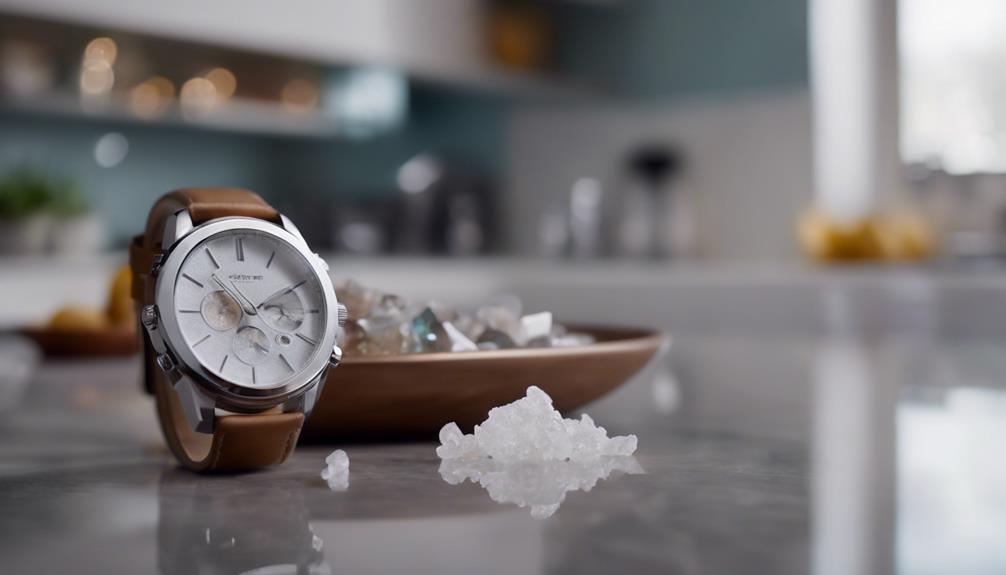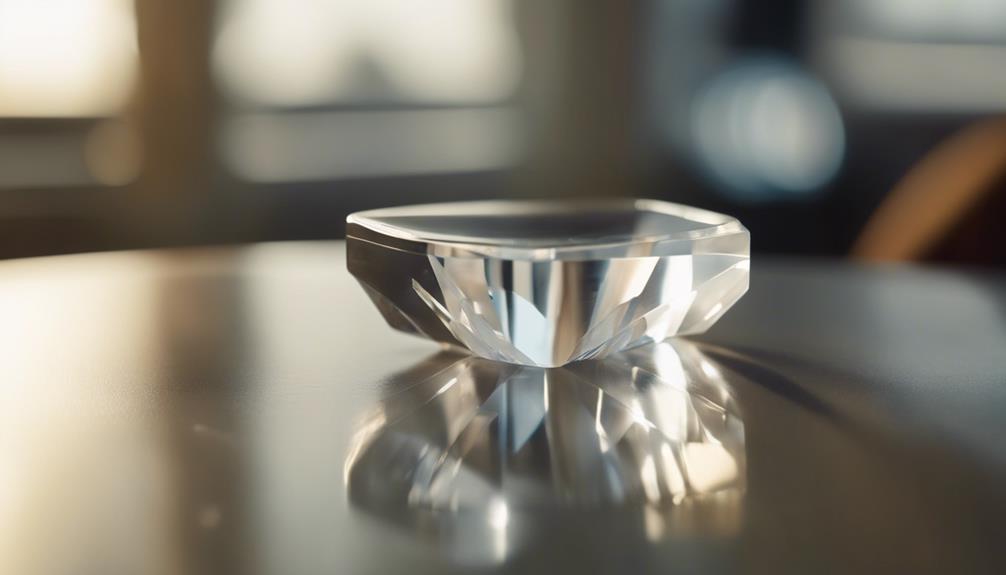In the age of smartphones and digital technology, we often forget the timeless value of quartz. We’ve seen its versatility in everything from elegant watches to durable kitchen countertops, not to mention its pivotal role in the realms of technology and construction.
But what truly sets quartz apart in these various applications? Its unique properties offer more than meets the eye, making it indispensable in industries far and wide. As we explore the myriad uses of quartz, we’ll uncover why this mineral remains a cornerstone in both traditional crafts and modern innovations.

Join us as we unravel the multifaceted world of quartz, where its best applications are yet to be fully appreciated.
Key Takeaways
- Quartz is indispensable in enhancing solar panel efficiency and renewable energy applications.
- Its piezoelectric properties revolutionize sensor technologies in various fields.
- Quartz’s stability is crucial for advancements in quantum computing and high-frequency communications.
- The material is essential for driving future innovations and sustainability in technology and energy sectors.
Jewelry and Gemstone Uses
Quartz’s widespread use in jewelry making and gemstone production, particularly in varieties like Citrine, Amethyst, Rose Quartz, and Aventurine, stems from its durability and the diverse color range imparted by impurities, making it an ideal choice for crafting intricate and long-lasting jewelry pieces. Its hard and resilient nature ensures that jewelry made from quartz can withstand everyday wear, preserving its beauty and structural integrity over time. This durability is a key factor that designers and consumers highly value, as it guarantees that their investment remains timeless.
The array of colors that quartz offers, from the deep purples of Amethyst to the warm hues of Citrine, is due to the various impurities within the mineral. This palette enables a creative freedom that’s unmatched, allowing for the production of unique and customized jewelry pieces that cater to individual tastes and preferences. Furthermore, quartz’s affordability makes it a highly attractive option for both jewelry makers and buyers, providing the luxury of gemstone adornment without the steep prices associated with more rare stones.
Technological Applications
Transitioning from its aesthetic applications in the jewelry industry, we now explore quartz’s pivotal role in technological advancements, where its stable electrical properties have become essential in the manufacturing of oscillators for precise timekeeping devices. This property isn’t just a boon for the world of horology but extends its benefits to various sectors that depend on exact time measurement, including telecommunications and computing.
In the realm of glassmaking, quartz’s significance can’t be overstated. Its ability to withstand high temperatures and its chemical purity make it an ideal base material for creating specialized glass used in high-tech equipment such as lasers, microscopes, and telescopes. This level of purity and durability is why it’s preferred for technological applications that demand precision and reliability.
Moreover, in the foundry industry, quartz sand plays a critical role. It’s utilized both as a mold and a method to remove impurities from molten metals during the casting process, ensuring the production of high-quality metal components. Similarly, in the refractory industry, quartz’s heat resistance is exploited to produce bricks capable of withstanding extreme temperatures, serving as a crucial component in high-temperature metal smelting processes.
These applications underscore quartz’s versatility and indispensability across technological domains, from enhancing the accuracy of timekeeping devices to contributing to the production of high-quality glass and metal products. Its chemical purity and physical properties not only make it valuable in aesthetic applications but also solidify its status as a cornerstone in the advancement of technology.
Countertop Selection Guide

Having explored quartz’s significant impact on technology, we now turn our attention to its role in modern home aesthetics, particularly as a leading choice for countertops in contemporary kitchens. Quartz countertops, renowned for their virtually limitless color and design possibilities, empower homeowners to achieve a tailored and modern look. This customization aspect is crucial in today’s home improvement projects, where individuality and style are paramount.
The allure of high-quality quartz countertops extends beyond their aesthetic appeal. They boast a maintenance-free, non-porous surface, highly resistant to moisture, dirt, and contaminants. This characteristic simplifies cleaning routines to mere soap and water, a significant advantage in the fast-paced modern household. Furthermore, their resilience against scratching or chipping translates into enduring quality and an uplift in home resale value, a critical consideration for any home improvement investment.
However, the premium nature of quartz countertops is reflected in their cost. Despite the higher initial outlay compared to other materials, their durability, low maintenance, and stylish appearance justify the investment for many. It’s worth noting that the complexity of their manufacturing process necessitates professional installation, restricting DIY endeavors but ensuring a precise and lasting fit. In weighing the pros and cons, quartz emerges as a luxury yet practical choice for contemporary kitchens.
Industrial and Construction Roles
In industrial and construction contexts, quartz stands out for its heat resistance, strength, and durability, making it an indispensable material in these sectors. Its unique properties not only contribute to its widespread use but also underline its significance in demanding environments.
For instance, in the foundry industry, quartz sand plays a crucial role in metal casting applications. It’s not just about aiding in molding; quartz sand also helps remove impurities from molten metals, ensuring the production of high-quality castings.
Furthermore, the refractory industry benefits greatly from quartz. Here, it’s utilized to produce heat-resistant bricks, which are essential in furnaces and kilns that operate at extremely high temperatures. Quartz’s ability to act as a flux for smelting metals underscores its versatility and efficiency in industrial processes.
In the realm of construction, particularly within the cement industry, quartz’s contributions can’t be overstated. Its properties significantly enhance the quality of cement products. This is because quartz influences the chemical reactions during the cement production process, resulting in materials that exhibit superior durability and strength.
These applications in industrial and construction roles showcase quartz’s reliability and versatility, making it a cornerstone in sectors that demand the highest levels of performance and resilience.
Beauty in Everyday Objects

We often overlook how quartz elevates the aesthetic appeal of everyday objects, from elegant jewelry to sophisticated home decor, due to its remarkable beauty and versatility. This natural stone, celebrated for both its durability and attractiveness, finds its way into our lives through various forms.
When we delve into how Quartz Countertops Are Made, we discover a meticulous process that transforms raw quartz into stunning surfaces that rival the elegance of marble. This synthesis of natural quartz with resins and pigments results in countertops that aren’t only visually appealing but also exceedingly durable and resistant to stains.
Quartz’s versatility extends beyond the kitchen and bathroom countertops. Its ability to mimic the look of natural stones, such as marble, while offering enhanced durability, makes it a preferred choice for a wide range of decorative items. From vases and sculptures that add a touch of sophistication to living spaces to watches and clocks that combine functionality with style, quartz’s application in creating visually appealing everyday objects is unmatched.
This stone’s adaptability in terms of shape, color, and finish allows it to seamlessly integrate into any interior design, elevating the overall aesthetic of our environments.
Future Innovations With Quartz
We’re witnessing a significant shift towards the integration of quartz in groundbreaking technological and renewable energy applications.
Our research focuses on leveraging quartz’s exceptional properties, such as its piezoelectricity and chemical stability, to pioneer advancements in solar panel efficiency and energy storage solutions.
These efforts aim to capitalize on quartz’s potential to revolutionize sensor technologies and drive the development of next-generation electronics for a more sustainable future.
Quartz in Technology Advances
Quartz’s piezoelectric properties are revolutionizing the landscape of technological advancements, from precise timekeeping in electronic devices to potential breakthroughs in quantum computing and advanced sensors. We’re witnessing a dramatic shift in how quartz crystals are harnessed across various sectors. The stability of quartz in electronic components, especially over a wide temperature range, positions it as a linchpin for future innovations.
- Enhanced sensors in medical devices leveraging quartz’s precise oscillations for better diagnostics.
- Quantum computing breakthroughs, where quartz’s stability could lead to more reliable qubits.
- High-frequency communication systems that rely on quartz for improved signal clarity and efficiency.
These advancements underscore quartz’s critical role in pushing the boundaries of technology advancements, making it indispensable in the evolution of electronic devices and beyond.
Renewable Energy Applications
Building on its significant impact in technology, quartz also plays a pivotal role in the realm of renewable energy, particularly in the advancement of solar power systems. Its high purity and semiconductor properties are crucial for producing silicon wafers, the heart of solar panels that convert sunlight into electricity. Moreover, quartz’s thermal stability enhances the efficiency of solar thermal panels and concentrating solar power systems, which are essential for generating renewable energy. Additionally, it’s indispensable in the development of energy storage technologies, including batteries and capacitors, ensuring a reliable supply of green power.
| Application | Role of Quartz |
|---|---|
| Solar Panels | Converts sunlight to electricity |
| Silicon Wafers | Core of solar cells |
| Solar Thermal Panels | Harnesses solar energy |
| Energy Storage Technologies | Vital for batteries and capacitors |
Frequently Asked Questions
What Are the Most Common Uses of Quartz?
We’ve found quartz’s most common uses include crafting jewelry, making glass, and manufacturing quartz watches. It’s also pivotal in creating semiconductor chips and optical instruments, showcasing its versatility and technological significance.
What Is the Downside to Quartz Countertops?
We’ve found that quartz countertops’ downsides include their heat sensitivity, higher price point, limited design options, necessity for professional installation, and specific maintenance requirements, which can complicate their use in certain environments and applications.
Is Quartz Better Than Granite?
We’ve found that quartz often surpasses granite in durability, demands less maintenance, and offers more consistent aesthetics. Despite its higher price, quartz’s heat resistance and range of colors make it a worthy investment.
What Are the Benefits of Quartz Surfaces?
We’ve found that quartz surfaces offer remarkable durability, heat resistance, and aesthetic variety. They’re low maintenance, requiring no sealing, and their manufacturing has a lower environmental impact, making them an excellent choice for many.
Conclusion :What Is Quartz Best For
In conclusion, we’ve seen that quartz, much like a chameleon, adapts across various industries, proving itself invaluable.
From adorning our bodies as fine jewelry to underpinning the technology in our watches, and from enhancing our homes as durable countertops to playing a critical role in construction, quartz’s versatility is unmatched.
As we continue to innovate, quartz’s unique properties promise to pave the way for future applications, possibly in areas we haven’t even imagined yet. Its adaptability and durability make it an indispensable material in our modern world.






Leave a Reply